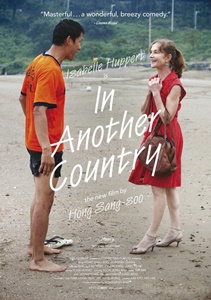Hong’s work about love, lust and life is hilarious and oddly touching insofar as one finds an English-speaking Isabelle Huppert trying to communicate with awkward Korean men funny.
Dir. Hong Sang-soo
2012 | South Korea | Drama/Comedy | 89 mins | 1.85: 1 | Korean, English & French
Not rated (likely to be NC16 for some sexual references)
Cast: Isabelle Huppert, Yoo Joon-Sang, Jung Yu-mi
Plot: A triptych centered on a trio of French tourists visiting the same seaside resort.
Awards: Nom. for Palme d’Or (Cannes)
International Sales: Finecut
Accessibility Index
Subject Matter: Light
Narrative Style: Slightly Complex
Pace: Slightly Slow
Audience Type: Slightly Arthouse

(Reviewed on DVD – first published 8 Sep 2018)
Spoilers: No
I have seen about half a dozen of Hong Sang-soo’s films so far (he is so impossibly prolific that it’s hard to keep up), but I must say that this is the first one to make me laugh… out loud. Not sure how it fares in the auteur’s body of work from a critical point-of-view, but In Another Country is my new favourite Hong.
That being said, like most of his works, it is not a particularly great film, and it is easy to dismiss it as an experiment in doing the same thing a new way. Here, he has French star Isabelle Huppert in the lead role, playing three different women in three different ‘stories’ cooked up by an imaginative writer.
Anne, as she is called, comes to a Korean seaside town to stay. But in each version, she adopts a different persona, marked by a different context to which her presence in this town would begin to make sense.
The first one sees her reconnecting with an old flame who already has a pregnant wife, whilst the second story centers on her romantic fling with an older filmmaker. The third, however, sees her seeking refuge after a divorce.
Huppert, of course, communicates in English, and this is Hong’s masterstroke, at least in the context of the film—that he is able to make a film about love, lust and life hilarious and oddly touching insofar as one finds these conversations (between a French woman and awkward Korean men) funny.
The figure of the lifeguard who appears for extended stretches of time in the trio of stories best illustrates and anticipates Hong’s unique take on cross-cultural understanding (or the lack thereof).
There are recurring locales in each of the three parts, with Hong cleverly playing around with the idea of temporality within spatiality to suggest both presence and absence—inasmuch as cause and effect become explicitly related to time when space is constant.
Two fascinating scenes would explain this more clearly: In the first ‘story’, Anne cautions the pregnant wife to not step on the broken glass of a soju bottle lying on the beach. In the third ‘story’, a drunken Anne throws and breaks a similar bottle on the same beach, possibly in the same spot.
The broken soju bottle, a marker of Anne’s presence/absence, becomes Hong’s way of distilling the circularity of life—that there’s only one self and essentially only one story. But the bigger, philosophical question for us is: where are they in our lives?
Grade: B+
Trailer:












[…] actresses—French screen legend Isabelle Huppert (whom Hong worked with previously in 2012 for In Another Country) and Kim Min-hee (who rose to international prominence for her seductive performance in Park […]
LikeLike